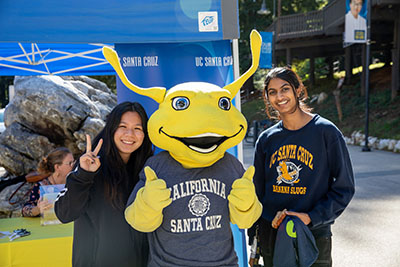Campus News
The fast and the generous
Generosity was out in force at UC Santa Cruz’s sixth-annual Giving Day, with 3,056 donors kicking in more than $629,414, which surpassed last year’s $600,000 figure. UC Santa Cruz students, faculty, staff, parents, friends, and alumni across the country participated.

Generosity was out in force at UC Santa Cruz’s sixth-annual Giving Day, with 3,056 donors kicking in more than $629,414, which surpassed last year’s $600,000 figure.
UC Santa Cruz students, faculty, staff, parents, friends, and alumni across the country participated in supporting Giving Day, a fast-paced and mostly online philanthropic festival.
“The strong response just goes to show that our donors are very passionate,” said Marissa Fullum-Campbell, director of annual support at UCSC. “Donors give to projects because they feel engaged and connected throughout the entire year. They respond to programs they like, especially when those programs are in need of funds or trying to move forward to create new opportunities and exciting projects.”
Fullum-Campbell said the total figures could tick up in the coming weeks because staff members are tallying results. Some donors gave to the university in honor of Giving Day but did not use the Giving Day platform, so their donations have not yet been added to the totals, she noted.
Last year, donors came out in force to support projects responding to the COVID crisis and to wildfires that devastated Santa Cruz County.
“This time around, we’re seeing more of a return to normalcy, with donors following that trend, returning to projects that have a large student support network,” Fullum-Campbell noted.
She had a special shout-out for UCSC community members—including faculty, staff, administration, and friends of the campus—who put forward their own matching funds or pooled resources with coworkers and friends for matching challenges.
Part of the fun of Giving Day is the “real time” aspect. With a finger click, donors could see how their projects are faring in challenges throughout the day. Each Giving Day project gets its own dedicated web page, with detailed information on projects and where the funding is needed.
UCSC Chancellor Cynthia Larive was one of the many community members who got caught up in the action of Giving Day.
“I watched the tally inch up all day and into the night” said Larive, who praised the impact and reach of this annual event.
“Giving Day is an important mechanism for fundraising for student groups, but it is so much more,” Larive noted “It strengthens our engagement and connections with our broader community of alumni, parents, and employees and builds camaraderie as we all work together to advance the institution.”
This year, at least 130 projects vied for funding. Though most of the action happened online, there was a booth on campus with Sammy the Slug greeting members of the campus community, who made pledges and posed for photos.
The fundraiser hinges on peer-to-peer outreach, a strong sense of social responsibility, and the good-natured spirit of teams trying to outdo each other to win bonus challenge dollars.
The end result is a formula for success. A pattern seems to be emerging; every year, donors and teams keep stepping up their game, with more projects participating, more donors kicking in funds, and more money for teams.
A variety of exciting challenges kept the adrenaline flowing throughout the day-long event. The Okinawa Memories Initiative performed at the top or as a runner up in several challenges, earning more than $5,000 in challenge funds.
The initiative, formerly called the Gail Project, is designed to help undergraduate and graduate researchers gain valuable out-of-classroom experience from professionals while advocating Okinawan history. Proceeds from last year’s Giving Day helped the initiative send a group to Okinawa to capture the stories of many local people.
Sponsored by Chemistry and Biochemistry Professor John MacMillan, interim vice chancellor of research, the Early Riser gift goes to the two teams that earn the most gifts from 7 to 9 a.m on Giving Day. The Okinawa Memories Initiative also triumphed in the “Mad Dash” challenge that took place between 6 and 8 p.m, gaining $1,000 for the project, made possible by an anonymous donor and Herbie Lee, vice provost for academic affairs.
The top three teams with the highest number of donors earned additional funds in the much-anticipated Final Frenzy competition, thanks to the generosity of the UC Santa Cruz Foundation.. The number-one team in that competition was the STEM Diversity Program, which earned a $7,800 matching-gift prize, with an impressive 381 donors. Matching funds were provided by Xingci Situ, a staff member of the campus’s STEM Diversity Programs’ Yulianna Ortega, director of the diversity program; and anonymous donors.
The STEM Diversity Program provides direct services that support students and bolsters their science identity through research training, professional development, and academic support. It supports students from underrepresented and underserved backgrounds to achieve their educational and career goals by providing hands-on research experience and fostering a sense of inclusion, acceptance, and community.
The STEM Diversity Program has mentored more than 1,500 undergraduates and 215 Ph.D. students in STEM fields over the past 40 years
Okinawa Memories Initiative came in second in that challenge with 329 donors, earning a $2,500 matching-gifts prize. Outdoor recreation provider Adventure Rec; weekly student newspaper City on a Hill Press; and the Alumni Association Scholarship Fund, now celebrating its 30th anniversary, took the third and fourth place, respectively.
This year’s Giving Day site was the most engaging and interactive to date, with a U.S. map showing where all the donations were coming from in real time, and also ranking the states in terms of donation numbers.
California had the number-one spot by a wide margin, with 3,251 gifts. But almost every state in the union had people who stepped up for UCSC. Slug supporters in Texas stepped up with 20 gifts. Even Alaska—more than 3,000 miles away from campus—represented for UCSC, with seven donations.